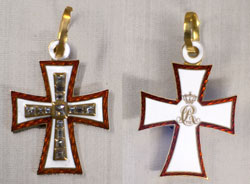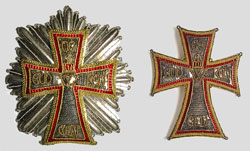The Order of Dannebrog was instituted by King Christian V in 1671 as a revival of an alleged older order instituted by King Valdemar Sejr after the battle of Lyndanisse
(in Estonia) in 1219. A proof of the existence of this older order has however never been found.
The order had one class and the members were called 'white knights' (as opposed to the
Order of the Elephant's 'blue knights').
The order was reformed by King Frederik VI in 1808, who not only introduced several classes after the french model, but who also spread out the awards to a larger audience.
 The original knight badge until 1808.
The original knight badge until 1808.
Later used as Grand Cross after 1808.
(The Chapter of the Orders)
With the reform the insignias of the order was changed, while the existing badge continued as the class 'Grand Cross' and later as 'Grand Cross with diamonds until 1912.
The classes of the order in 1808 were then:
- Grand Commander
- Grand Cross
- Commander
- Knight
- Silver Cross ('Dannebrogsmand')
The classes and the insignias were adjusted along the way - The Commander class was split in two (with and without breast star) in 1863 (1861 for foreigners). The Knight
class was split in two in 1952. In 1951 the statutes were changed so women could be allowed in the order.
 Embroidered stars for Grand Cross and Commander.
Embroidered stars for Grand Cross and Commander.
After 1909 metal stars were awarded.
The current classes are:
- Grand Commander
- Grand Cross (with or w/o diamonds)
- Commander 1. class
- Commander
- Knight 1. class
- Knight
- Silver Cross
All Grand Crosses will have their coat of arms placed in the chapel of the church at Frederiksborg Castle in Hillerød.
The insignias of the order
The pre-1808 knight badge was a white enamelled cross set with diamonds and with red edges. On the reverse it carried the monogram of the awarding monarch. The badge was worn from a white
sash with red edges. An embroidered star was worn on the breast.
The current badge is a white enamelled cross with red edges. Between the cross arms are small crowns and above the cross is the monogram of the awarding monarch under a
large crown. The monogram is changed for each new monarch.
On the obverse is the motto 'Gud og Kongen' ('God and the King') and a crowned 'C5' for King Christian V.
On the reverse are the years '1219', '1671' and '1808', a crowned 'W' for King Valdemar Sejr and a crowned 'FVI' for King Frederik VI.
 Current insignias.
Current insignias.
From left: Breast star for Grand Cross/Grand Commander, Commander/Grand Cross badge,
Breast star for Commander 1. class, Knight 1. class badge and Silver Cross.
The badges for the Grand Cross and the Commander classes are identical, but are worn from a sash (or a collar) and a neck ribbon respectively. The Knight Cross 1. class and Knight Cross
are identical to the Commander Cross, but smaller and made of gold/enamel and silver/enamel respectively. The Silver Cross is silver without enamel.
An eight-pointed breast star is worn with the Grand Cross and Grand Commander class, while a cross-shaped breast star is worn with the Commander 1. class.
All insignias of the order must be returned upon the death of the recipient.
Sources:
Stevnsborg, Lars "Kongeriget Danmarks Ordener, Medaljer og Hæderstegn" (2005)
Grandjean, H.F "De Kongelige Danske Ridderordener" (1903)
Christensen, Rolf "Danske Ordensinsignier" (1998)
Bencard, Mogens og Tage Kaarsted "Fra Korsridder til Ridderkors" (1993)